Mitsui Chemicals Formulates VISION 2030 Long-Term Business Plan
2021.06.02
The Mitsui Chemicals Group today announced that it has formulated VISION 2030, a long-term business plan starting in 2021 and running through to 2030.
1. Overview of VISION 2030, our Long-Term Business Plan for 2030
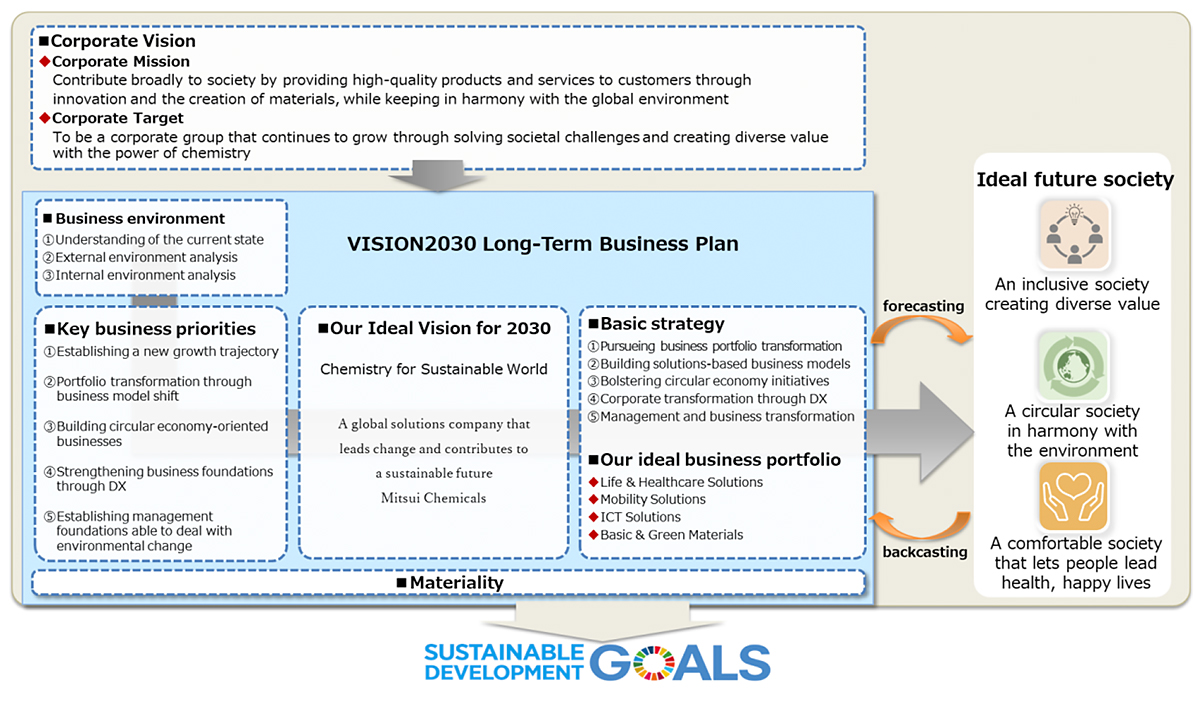
2. Corporate Vision (Corporate Mission and Corporate Target)
As our Corporate Mission, we at the Mitsui Chemicals Group aim to contribute broadly to society by providing high-quality products and services to customers through innovation and the creation of materials, while keeping in harmony with the global environment. We are also implementing a triple bottom line management approach based on economic, environmental and social considerations, and working to solve social challenges through our business activities.
And now in formulating our VISION 2030 Long-Term Business Plan, we have revised our Corporate Target, which is focused on where we want to be in 15–20 years. Our new Corporate Target is to be a corporate group that continues to grow through solving social challenges and creating diverse value with the power of chemistry.
Returning once again to our purpose of solving challenges faced by society, the Mitsui Chemicals Group will make full use of the power of chemistry – the very thing that allows us to create diverse value – to tackle a wide range of social challenges that arise in the face of accelerating environmental change. Aiming to become a corporate group that continuously provides solutions to these challenges, we will endeavor to make Group-wide efforts.
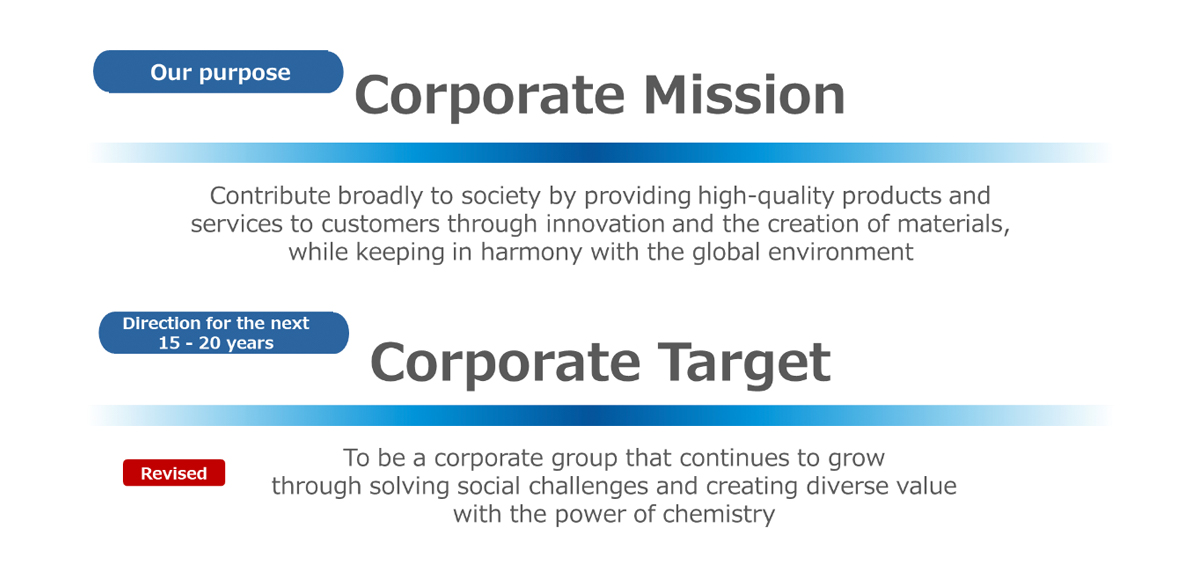
3. Our ideal vision for 2030
As we head toward 2030 – a checkpoint for our Corporate Target – we are looking to confront the rapidly changing social environment and social challenges before us in a head-on manner. To this end, we have created a vision for realizing our new growth strategies based on the transformation we are pursuing as a company, with the ideal vision we have for the Mitsui Chemicals Group in 2030 defined as follows:
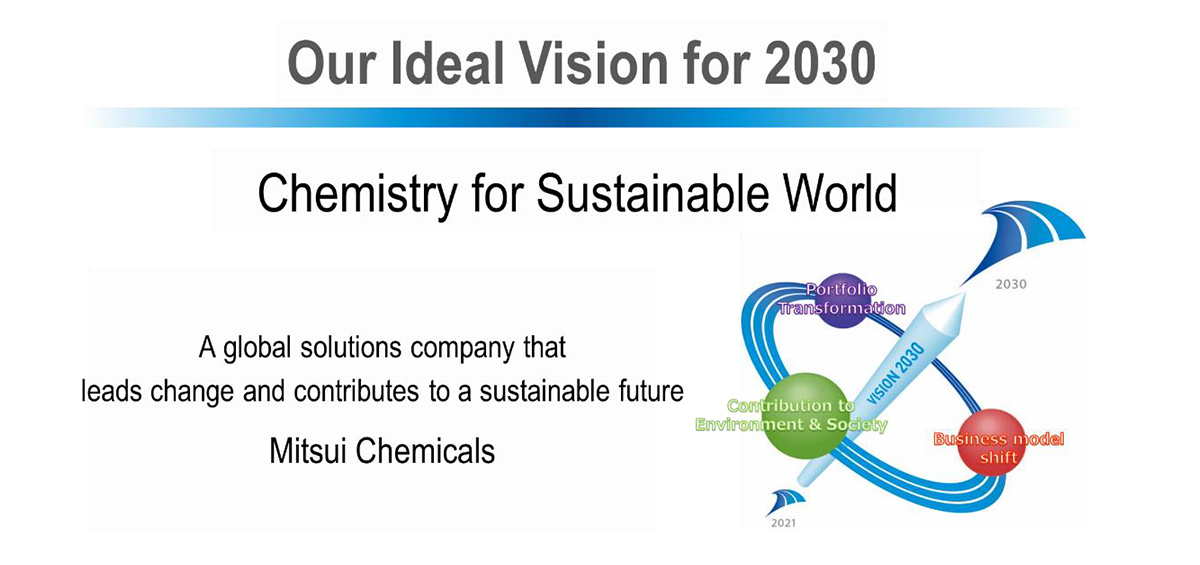
4. Environmental awareness and key business priorities
The global environment surrounding the chemical industry is changing in major ways. What is more, this change is becoming faster and faster. We recognize that if we are to continue creating the value sought by society, consumers and customers under this increasingly uncertain environment, we will need to do more than simply keep up our conventional management approaches and business strategies. We have therefore looked to define our company’s business transformation by way of the following issues and focal points.
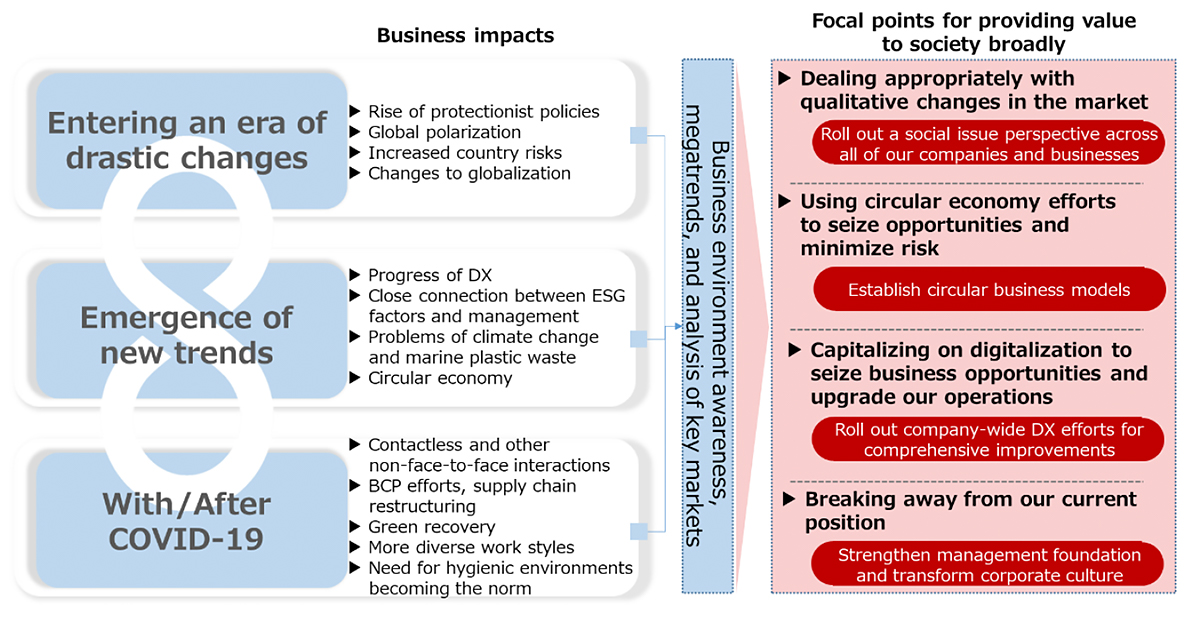
5. Ideal future society and materiality
(1)Ideal future society
In light of megatrends as well as the internal and external environments we face, we have defined our ideal future society – a vision of society the Mitsui Chemicals Group aims to realize by contributing to solving potential environmental and social challenges that could arise going forward – as follows:
- An inclusive society creating diverse value
- A circular society in harmony with the environment
- A comfortable society that lets people lead healthy, happy lives
(2)Materiality
To bring about the sort of future society described above, we have decided on a number of areas in which the Mitsui Chemicals Group should contribute, as well as prerequisites and essential abilities needed to make these contributions, as part of a revised approach to materiality. This materiality will be embedded in our Long-Term Business Plan, including in the plan’s Basic Strategy, as we endeavor to achieve our goals here.
① Contributing to a sustainable society
- Climate change
- Circular economy
- Health and livelihood
- Highly livable communities
- Food safety and security
- Product design based on full life-cycle considerations
② Prerequisites for business continuity
- Safety
- Respect for human rights
- Risk and compliance management
- Product quality
- Stable production
③ Abilities essential to business continuity
- Corporate culture
- Human capital
- Innovation
- Digital transformation
- Partnerships
6. Business model transformation
If we are to help solve social challenges – and use our efforts toward this as a driver of sustainable growth – we will need to move away from our historical business focus on materials supply, instead getting our entire Group and all of our businesses to base themselves on a social issue perspective, solutions-based business models, circular economy-based business models and digital transformation. Rather than simply resting on our laurels with the business model and approach that has brought us success in the past, we will work hard on carrying out this business model transformation, looking here to better create the value sought by society, consumers and customers.
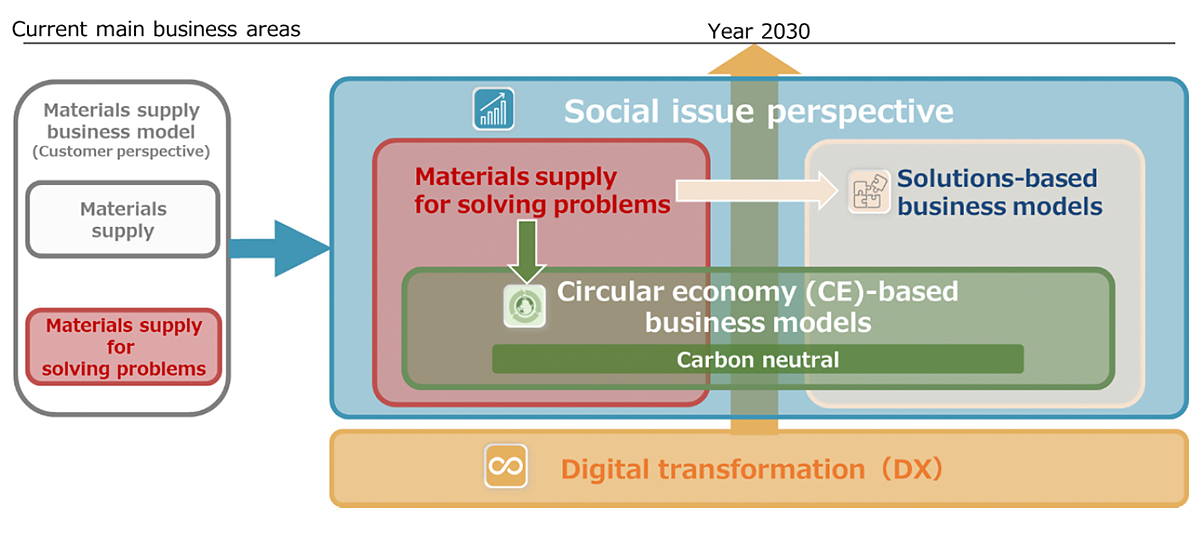
(1)Social issue perspective
We will look to roll out a social issue perspective across all of our companies and businesses. This will allow us to get closer to society, consumers and customers; capture latent needs and pain points in an advanced and precise manner; and tie this into product and service development, performance testing and other such efforts. Based on this approach, we aim to further grow and flesh out all of our businesses, and to actively pursue open innovation, tie-ups with external partners and so on as necessary means toward solving social challenges.
(2)Solutions-based business models
With the demands of society continuing to give rise to increasingly complex needs, we intend to create high-added-value offerings that better fit these needs. To this end, we will scale up our solutions-based business models, through which we will combine conventional materials supply with services and more to deliver solutions.
(3)Circular economy-based business models
Having reached the conclusion that it will be difficult to maintain businesses with high energy consumption going forward, we will look to launch circular economy-based business models. This will see circular economy efforts – which are becoming increasingly important – pursued Group-wide and will also involve reforming our business structure by such means as moving over to greener materials.
(4)Digital transformation
By rolling out Group-wide digital transformation efforts, we aim to further improve our various business models, operational processes, organizational capabilities and more.
7. Group-wide Basic Strategy under VISION 2030
To succeed with our management priorities, our ideal vision for 2030 and our more long-term Corporate Target, the Mitsui Chemicals Group will, on a Group-wide level, pursue the following five basic strategies:
(1)Pursuing business portfolio transformation
① Rolling out a social issue perspective in all of our businesses
② Achieving growth by expanding and fleshing out our business domains
③ Accelerating structural reform of our existing businesses and transforming businesses with a focus on green materials
(2)Building solutions-based business models
① Creating new businesses by bolstering our business design capabilities
② Pursuing cross-organizational ties and strengthening cross-company partnerships
(3)Bolstering circular economy initiatives
① Building circular economy-oriented business models for all of our businesses
② Rolling out circular economy-compatible products by transitioning to alternative raw materials and fuels
③ Developing and acquiring foundational technologies able to contribute to carbon neutrality
(4)Corporate transformation through digital transformation
① Applying digital transformation throughout our entire Group and all business domains
② Creating value by way of business-wide transformation spanning research, production, sales and supply chains
(5)Management and business transformation
① Popularizing a committed, eager attitude
② Improving engagement to bolster our organizational strength and transform our corporate culture
③ Combining safe, secure operations with improved competitiveness at all our bases around the world
④ Building sustainable supply chains
8. Business portfolio
To help carry out our basic strategies for growing the Mitsui Chemicals Group – and to let us further expand and flesh out our business domains – we have decided to restructure our existing portfolio, adopting the following four-part portfolio going forward.
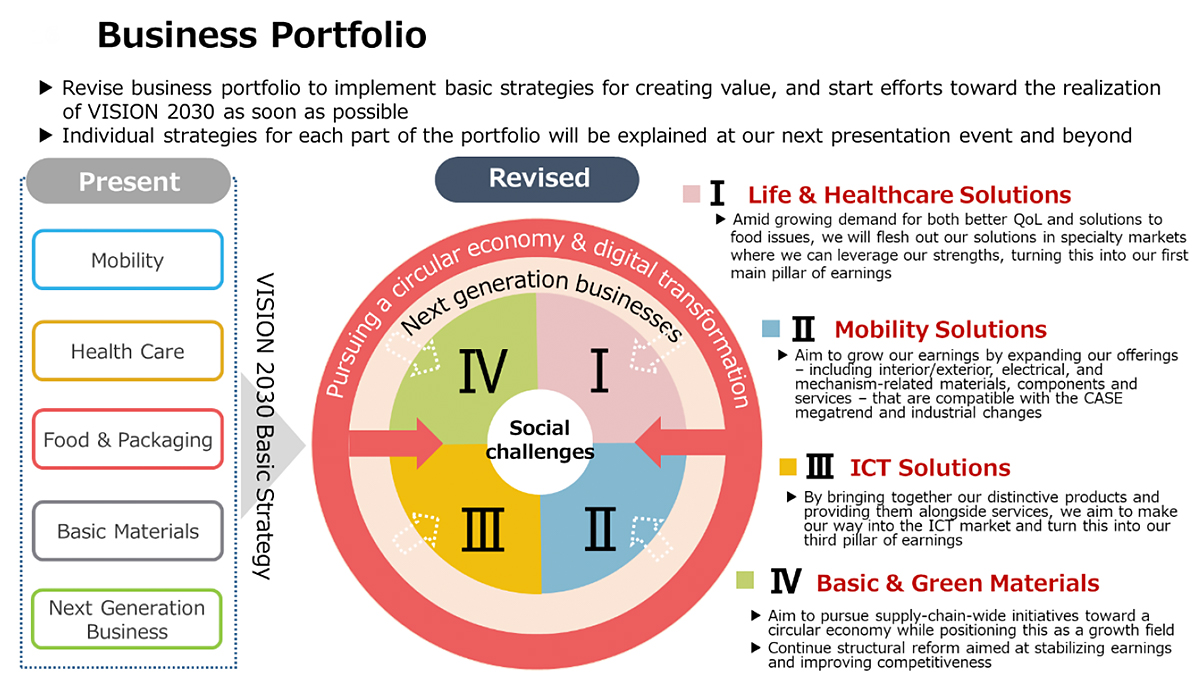
9. Carbon neutrality
As outlined below, the Mitsui Chemicals Group has drawn up a roadmap toward achieving carbon neutrality by 2050. Our efforts here will center around two pillars; the first being to achieve carbon neutrality by reducing our greenhouse gas (GHG) emissions, implementing carbon-negative measures and more, while the second is to contribute to society and customers through our products. Going forward, we will continue endeavoring to optimize this roadmap and put any necessary measures in place.
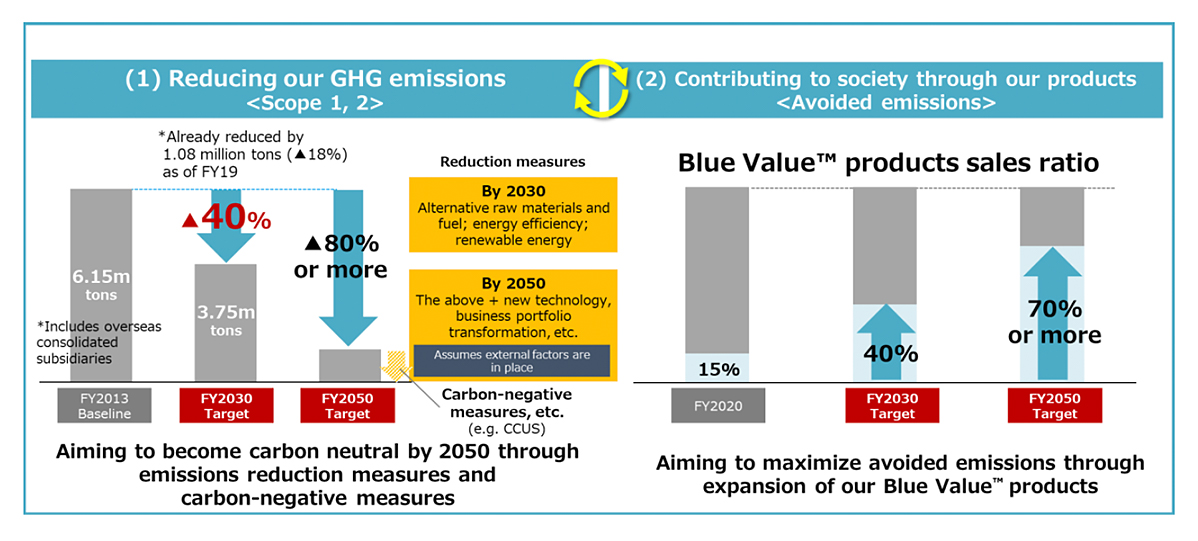
10. VISION 2030 business targets
By acting on our triple bottom line management approach and securing the VISION 2025 business targets, we aim to achieve the following business targets set out in VISION 2030:
| FY2025 | FY2030 | ||
|---|---|---|---|
| Financial metrics | Operating income before special items | 200 billion yen | 250 billion yen |
| Net income attributable to owners of the parent | 110 billion yen | 140 billion yen | |
| ROIC | 8.0% or more | 8.0% or more | |
| Net D/E | 0.8 or less | 0.8 or less | |
| ROE | 10% or more | 10% or more | |
| Non-financial metrics | Blue Value™ sales ratio | 30% or more | 40% or more |
| Rose Value™ sales ratio | 30% or more | 40% or more | |
| GHG reduction | 25.4% (FY2030; vs. FY2005) |
40% (vs. FY2013) |
11. Resource investment plan
To help achieve the above business targets, we will move to invest 1.8 trillion yen toward growth over fiscal 2021–2030, with half of this going toward strategic investments and half toward internal growth.
12. Our plans going forward
Upon further consideration of details for VISION 2030 in the first half of fiscal 2021, the Mitsui Chemicals Group plans in the second half to announce the following:
(1)Growth strategy for each part of our business portfolio
(2)Optimal allocation of management resources
(3)Management planning system that integrates financial and non-financial metrics
Note: For more information on VISION 2030, please visit the following webpage:
Plans, targets and other forward-looking statements in this document are forecasts made based on currently available information, and could be affected by various risks and uncertainties. Actual business results going forward may diverge significantly from these forecasts due to a wide range of factors.
